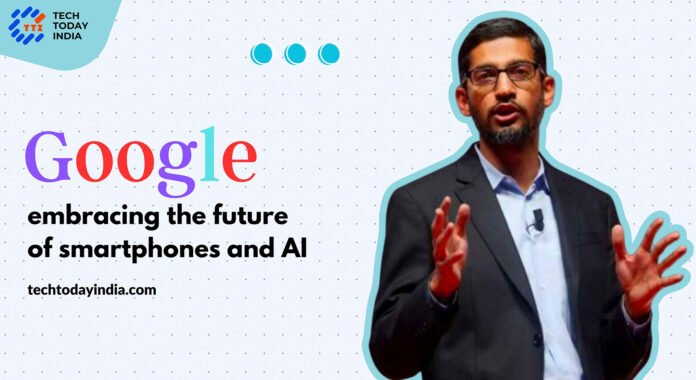The internet behemoth made important announcements at its yearly conference, Google I/O, showcasing its dedication to innovation. The introduction of Google’s first foldable phone, the Pixel Fold, together with the Pixel Tablet and the Pixel 7a, a less expensive variant of the Pixel 7 series, were among the highlights. The CEO of Alphabet and Google, Sundar Pichai, emphasized the importance of AI in all of the firm’s products, including smartphones. Pichai recently spoke about the significance of foldable phones, his ideal daily driver, and his vision for Google.
Pichai’s Favourite Technology
Pichai shared his smartphone choices with Arun Maini on the “Mrwhosetheboss” YouTube channel. Pichai admitted using a variety of phones, including the Pixel 7 Pro, Samsung Galaxy, and iPhone when asked about his preferred model. He emphasized the adaptability of his usage by stating that he has many numbers and likes to experiment with different platforms.
Taking Foldable Phones’ Potential Into Account
Pichai clarified Google’s rationale for introducing a foldable smartphone. He stated that the business wants to push the limits of what is conceivable with computing equipment. The goal is to provide customers with increased functionality, entertainment, and productivity in a single device. Pichai highlighted the advantages of foldable designs while noting some trade-offs, including as some limitations on multitasking and the inability to use the device as a tabletop.
Pichai’s Perspectives on the Future of AI and Smartphones
Foldable phones are now marketed to people who are eager to experience the future now, according to Pichai. Although the possibilities offered by these gadgets are amazing, there is still much to learn about this area. Foldable phones are not the end goal, Pichai emphasised; rather, he thinks that AI will play a significant role in making smartphones more natural and intuitive to use.
In Pichai’s future, AI will allow computers to adapt to people rather than the other way around. Smartphones will be able to interpret commands and contextual information better because to advances in natural language processing and computer vision. This development will make it easier for people to interact with their gadgets, making computing more user-friendly.

Pichai added that smartwatches and augmented reality (AR) glasses will be accessories for smartphones. These wearable gadgets will enhance smartphone features and give people new ways to connect with technology, enhancing their online experiences.
The remarks made by Sundar Pichai regarding smartphones and AI in the future are particularly interesting. He anticipates a future when computers adapt to people rather than the other way around, and he believes that AI will play a significant role in making smartphones more natural and straightforward to use. It will be interesting to see how Google and other digital companies implement this idea in the years to come. This is an amazing goal.
Overall, Google I/O was successful for the company and offered a preview of what smartphones may look like in the future. Google is in a good position to take the lead in this quickly changing sector thanks to its emphasis on innovation and AI.
Here are some further ideas on how cellphones and AI will develop in the future
In many different ways, AI will be applied to enhance the performance and functionality of smartphones. AI can be utilised, for instance, to increase security, performance, and battery life. New smartphone functions and applications can be created using AI.
Additionally, AI will be utilised to personalise and improve the user experience of devices. AI can, for instance, be used to discover user preferences and routines and then utilise that knowledge to offer tailored advice and suggestions. AI can also be utilised to create novel ways for smartphone users to communicate with their devices, such as through gesture detection and natural language processing.
AI and smartphones have the ability to completely change how we live and work. Smartphones can be used to connect with others, access information, and manage equipment in our homes and places of business. AI may be applied to smartphones to make them smarter and more useful, as well as to provide us new ways to engage with the world around us.
Smartphones and AI have a promising future, and it will be fascinating to watch how these technologies advance in the years to come.
Disclaimer:
AI was used to conduct research and help write parts of the article. We primarily use the Gemini model developed by Google AI. While AI-assisted in creating this content, it was reviewed and edited by a human editor to ensure accuracy, clarity, and adherence to Google's webmaster guidelines.


